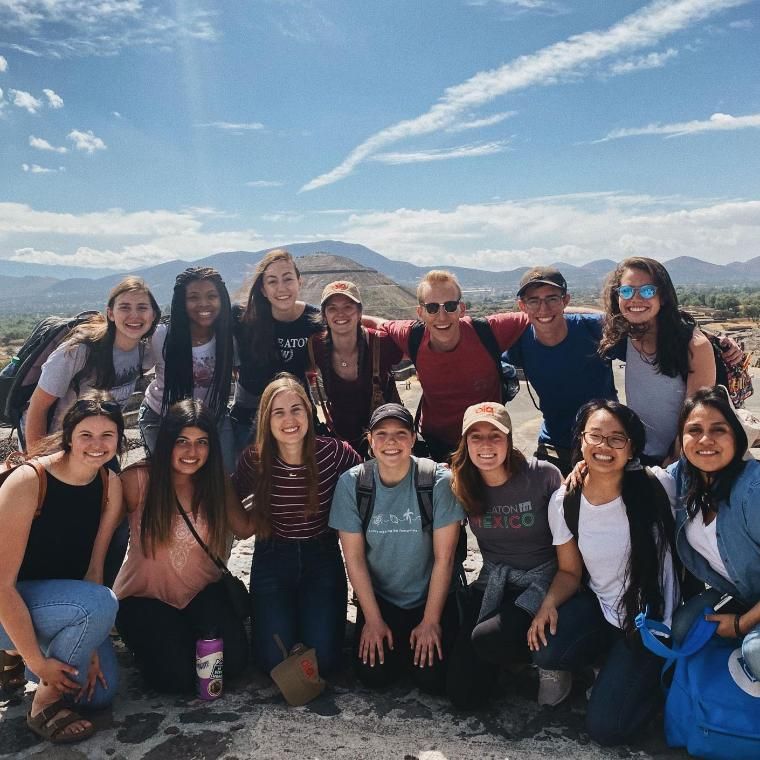Reflections on Social Advocacy and Change
 “Dios habla español; God speaks Spanish.” It’s a proclamation I’ve heard on more than one occasion, and it always comes with an irresistible smile that is only half teasing. I always smile back and nod my assent, because, while I believe that God transcends language and culture, I also know that God is an incarnated God who loves not only universally but also specifically and contextually. I used to think that language learning was just about memorizing vocabulary and grammar rules, yet as I have studied Spanish at Wheaton College, I’ve come to realize that is so much more. It is about listening, and it involves learning to see the world through a new linguistic and cultural lens. As I have taken the time to listen and to learn, I have had the opportunity to hear the God who does indeed speak Spanish. Through this process, my Latin American sisters and brothers have taught me much about who God is. In this way, my study of the Spanish language has taught me what it means to live life in the church as a part of a global community, and it had allowed me to hear the voices of Latin American Christians. Through them, I have deepened my understanding of God’s love.
“Dios habla español; God speaks Spanish.” It’s a proclamation I’ve heard on more than one occasion, and it always comes with an irresistible smile that is only half teasing. I always smile back and nod my assent, because, while I believe that God transcends language and culture, I also know that God is an incarnated God who loves not only universally but also specifically and contextually. I used to think that language learning was just about memorizing vocabulary and grammar rules, yet as I have studied Spanish at Wheaton College, I’ve come to realize that is so much more. It is about listening, and it involves learning to see the world through a new linguistic and cultural lens. As I have taken the time to listen and to learn, I have had the opportunity to hear the God who does indeed speak Spanish. Through this process, my Latin American sisters and brothers have taught me much about who God is. In this way, my study of the Spanish language has taught me what it means to live life in the church as a part of a global community, and it had allowed me to hear the voices of Latin American Christians. Through them, I have deepened my understanding of God’s love.
I never imagined that my study of Spanish would be so transformative in my Christian walk. I used to picture learning as something like filling up an empty bucket, but in both language learning and in learning about God, I have found it to be more a process of emptying out a bucket of preconceived ideas and expectations. This was especially true as I traveled to Central America to study abroad and was forced to question my understanding of God. The God who spoke Spanish, it turned out, was deeply troubling to me, and the Latin American church called me to reconsider what my faith truly meant.
One particular day stands out in my memory. Walking among homes built in the middle of a Nicaraguan garbage dump, I was overwhelmed with the feeling that my idea of God didn’t make sense anymore. My skin felt pasty white, and I was conscious of how I towered over even the men. My body was screaming, an uncompromising testimony to my life of privilege. I hated the stench, I hated myself and my life of excess, I hated God for creating such a world, and I hated those big, brown eyes, staring at me from among the trash, turning my carefully constructed world upside down. In that moment, life took the box I had made for God and dumped him out in one unceremonious sweep.
I wanted to reconstruct the world and my understanding of God. Thankfully, though, God is too big, and Jesus’ message too scandalous, and I never did fit God back into a comfortable box. My Latin American friends challenged me to reconsider who Jesus really was and what the social implications of his life and message were. As I reflected on this, I realized that Jesus did not come and fix the world and all its problems. Rather, he came and lived among the poor and the oppressed. He was one of them and he suffered with them. I had always pictured God as reaching down and working from above, yet I realized that Jesus was just like the children I encountered playing in the dump that day. He didn’t separate himself from the injustice or solve it from above: he himself became one of the oppressed.
At first, I was angered by this message. I no longer knew how I fit into God’s kingdom, and I was filled with unanswered questions. If Jesus is the face of the poor and the oppressed, what is his message for me, a selfish consumer living a life of privilege and indulgence? The thought gnawed away at me. I found I could no longer pray, for fear that God didn’t love me. Yet this shocking, confusing God who has continually defied all my attempts to understand and define him has slowly started to make so much more sense than the god of security and comfort I had created for myself.
The same Latin American brothers and sisters who destroyed my old image of God also helped me to understand God’s love in a new and deeper way. I have started to read the Bible with a fresh eye for who Jesus truly was, just as my Latin American friends have taught me to do. As I do this, I see a man whose life challenges my lifestyle and assumptions. However, I also see a man who worked to break down barriers and restore all people to each other and to himself. The time I spent in Central America initially made me question God’s love for me. Yet today it has left me with a much more profound understanding of God’s healing love for me and for all of his children.
This is a truth I hold onto with joy as I look forward to life after graduation.
My experience with the Spanish language has prepared me to enter into a process of reconciliation within the global church. I hope to pursue a career in the non-profit sector, joining in the work of development and reconciliation. As I pursue this course, what I have learned through my study of Spanish and my dialog with Christians from around the world will be invaluable. I will enter into this career bearing in mind what my Latin American friends have taught me about Jesus. Like him, I don’t aim to fix or to be the solution, but rather I hope to come along side, to participate in healing, and to listen. The God who speaks Spanish ruined my life; yet the God who speaks Spanish has also offered me the opportunity to be reconciled to him and to my brothers and sisters around the world. This is the scandalous message of the Gospel.
